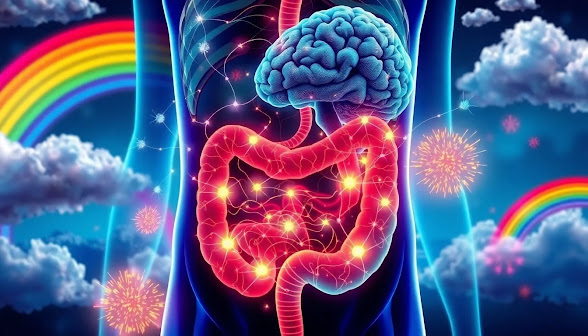The Gut-Brain Connection: How Your Stomach Affects Your Mood
Introduction
Have you ever felt anxious or down without a clear reason? What if your stomach could be playing a part? More research shows that our gut health is closely linked to how we feel mentally. Did you know that up to 90% of serotonin, the feel-good chemical, is made in our gut? This connection isn’t just a coincidence—it’s real science. Understanding how your stomach talks to your brain can help you manage stress, mood swings, and even depression. In this article, you'll discover how the gut-brain axis works, how it impacts mental health, and simple ways to keep your gut happy and your mood stable.
The Science Behind the Gut-Brain Axis
What Is the Gut-Brain Axis?
The gut-brain axis is a fancy name for the conversation happening between your stomach and your brain. It’s a two-way street—a message can travel from your gut to your brain, and vice versa. This communication system involves your nervous system, immune responses, hormones, and tiny bacteria called microbiota. Imagine your gut and brain as best friends sharing secrets through signals; when one changes, the other responds. This complex network helps regulate digestion, mood, and even your response to stress.
Role of Gut Microbiota in Mental Health
Microbiota are trillions of bacteria living in your gut. They do more than digest food—they influence your mental health too. These bacteria produce chemicals like neurotransmitters that your brain uses to feel happy, calm, or alert. For example, healthy microbiota boost serotonin levels, which improve mood and reduce anxiety. Recent studies have found that people with depression often have less diverse microbiota. That means poor gut health might be at the root of some emotional struggles.
Neurotransmitters and Hormones Produced by the Gut
Your gut isn't just about digestion—it's a chemical factory. About 90% of serotonin, a key mood regulator, is made in the gut. That’s more than in your brain! Other mood-related chemicals produced include dopamine and GABA, which help control feelings of happiness and calmness. When your gut microbiota are balanced, they send signals that support good mental health. When out of balance, mood can suffer. Think of your gut as a chemistry lab that influences how you feel every day.
How Gut Health Influences Mood Disorders
Connection Between Dysbiosis and Anxiety/Depression
Dysbiosis is a fancy word for an imbalance of bacteria in your gut. It can happen from poor diet, stress, or antibiotics. Symptoms include bloating, stomach pain, and irregular bowel movements. But guess what? Dysbiosis is also linked to mood problems. Research shows that people with depression and anxiety often have less healthy microbiota. Some studies found that restoring balance with probiotics improved their mood and reduced anxiety symptoms.
Inflammation's Role in Mental Health
A sick gut can cause inflammation, which isn’t good news for your head. When your gut is inflamed, tiny immune cells called cytokines flood your body. These cytokines can reach your brain and change how it works, leading to feelings of sadness or anxiety. Chronic gut inflammation has been linked to higher risks of depression and mood swings. Think of inflammation as a fire that heats up your entire system, including your mind.
The Impact of Gut-Related Conditions
Conditions like Irritable Bowel Syndrome (IBS), Crohn’s disease, and others don't just cause stomach pain—they often come with mood struggles too. Studies show people with these conditions are more likely to experience depression or anxiety. For example, research found that about half of IBS patients also report low mood or stress. Why? Because their gut problems are messing with the signals between their gut and brain.
Strategies to Support Gut Health and Improve Mood
Diet and Nutrition
What you eat can make or break your gut health. Foods rich in fiber, like fruits, vegetables, and whole grains, help feed good bacteria. Fermented foods such as yogurt, kefir, and sauerkraut are full of probiotics that boost microbiota diversity. Incorporate these into your meals regularly. Think of probiotics as allies that keep your gut bacteria in check and support your mood.
Lifestyle Modifications
Stress is a major enemy of gut health. Practice calming techniques like meditation or deep breathing. Regular exercise also helps promote healthy bacteria and clear your mind. Don’t forget sleep—restful sleep allows your gut and brain to reset. A good night’s sleep is like giving your gut a fresh start each day, helping keep your mood balanced.
Supplements and Medical Interventions
Probiotic supplements can be useful if your gut needs a boost. But always check with a doctor before starting them. They can recommend specific strains that suit your needs. In some cases, a healthcare professional might suggest other treatments like dietary changes or therapies. Keeping an eye on ongoing research can open new doors to better mental health through gut care.
Practical Tips for Maintaining a Healthy Gut-Brain Balance
- Make daily probiotic-rich foods part of your diet.
- Cut back on processed foods, sugar, and antibiotics unless prescribed.
- Manage stress with hobbies, exercise, or relaxation.
- Track your foods and moods to find what helps or worsens your mood.
- Stay hydrated and get plenty of sleep.
Remember, small habits can lead to big improvements in how you feel mentally and physically.
Conclusion
The link between your gut and brain is powerful. Taking care of your stomach isn’t just about digestion—it’s about your overall well-being. Building a healthy gut can help you feel calmer, happier, and more balanced. If you’re battling mood swings or anxiety, your gut health might be the key. Start making simple changes today—your mind and body will thank you. Always talk to a healthcare provider for personalized guidance. Your gut and your mood are more connected than you might think. Nourish one, and you'll nourish the other.



0 Comments